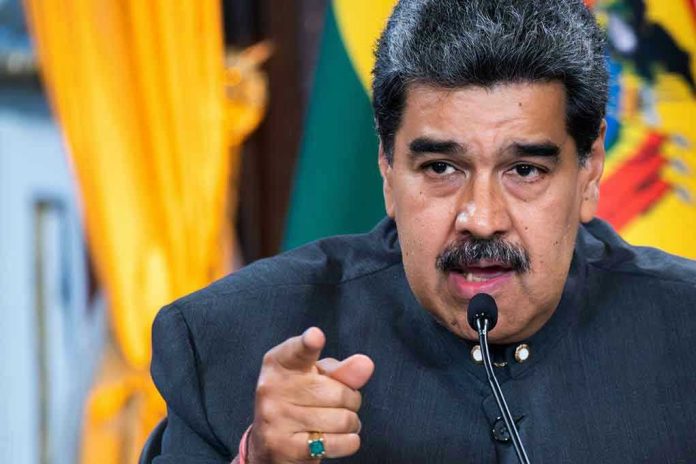
As Venezuela deploys 15,000 troops to its Colombian border and accuses the United States of plotting invasion, the escalating military standoff highlights the ongoing threat of foreign intervention and border insecurity under leftist regimes.
Story Snapshot
- Venezuela has sent 15,000 security forces to its border with Colombia, citing narco-terrorist threats and alleged U.S. aggression.
- The United States has deployed three warships to the region, fueling fears of foreign intervention and rising international tension.
- Maduro’s government frames the mobilization as a defensive measure, while critics see it as political posturing and distraction from internal failures.
- Heightened militarization risks destabilizing the region, straining local communities, and testing U.S. resolve to protect Western interests.
Venezuelan Troop Surge Signals Growing Regional Instability
Venezuelan President Nicolás Maduro ordered the deployment of 15,000 security personnel to the border states of Zulia and Táchira. Citing growing threats from narco-terrorist groups and cross-border criminal activity, Maduro’s administration simultaneously accused the United States of preparing for invasion, as U.S. warships moved closer to Venezuela’s coast. This dramatic escalation signals not only the volatility of the border with Colombia but also the persistence of anti-American rhetoric and military posturing by authoritarian regimes in the region.
Defense Minister Vladimir Padrino López confirmed naval deployments to the Caribbean and border patrols, highlighting Venezuela’s stated intent to combat drug trafficking. However, this show of force coincided with the U.S. Navy’s presence in the Caribbean and the doubling of the American bounty for Maduro on drug charges. Venezuela’s warnings about U.S. intervention and its call for civilian militia enlistment serve to rally nationalist sentiment while raising the risk of military miscalculation or direct confrontation between nations.
Historic Tensions and Power Struggles at the Border
Venezuela’s border with Colombia has long served as a flashpoint for smuggling, armed group activity, and violent clashes. The current deployment follows years of adversarial U.S.-Venezuela relations, marked by American sanctions and allegations against Maduro’s government for corruption and cartel involvement. While Venezuelan authorities claim to be targeting narco-terrorists, the timing of this mobilization—just as the U.S. increases its military presence—underscores the deep mistrust and strategic competition that have plagued the region for decades.
Past incidents have seen similar troop surges and diplomatic crises, but the latest escalation adds layers of complexity: rising humanitarian concerns, economic disruption in border communities, and the possibility of spillover violence into neighboring Colombia. The Zulia and Táchira regions are especially vulnerable, given their history of instability and their strategic importance to trade and security on both sides of the border.
Risks of Militarization and the Broader Regional Impact
The immediate consequence of Venezuela’s military buildup is heightened alert among border communities and the potential for clashes with armed groups or foreign forces. In the short term, increased troop presence may deter some cross-border criminal activity, but it also raises the specter of accidental or intentional confrontation with U.S. or allied forces in the region. Longer-term, prolonged militarization threatens to strain already scarce resources and deepen humanitarian challenges, including displacement and economic hardship for local residents.
International experts warn that such deployments often serve dual purposes: signaling political resolve at home while attempting to deter perceived threats from abroad. For the United States and its allies, this standoff tests the limits of diplomatic patience and strategic resolve in defending constitutional interests and regional stability. Critics argue that Maduro’s maneuvering distracts from domestic failures and erodes the rule of law, reinforcing the need for robust American engagement and vigilance against foreign regimes that threaten Western values and security.
READ NOW: Venezuela Deploys 15,000 Forces to Border as Nicolás Maduro Warns of Alleged U.S. Invasion — State media in Venezuela reported that Nicolás Maduro had deployed 15,000 security operatives to the nation’s border with…https://t.co/y1lyRBWGzc
— Top News by CPAC (@TopNewsbyCPAC) August 27, 2025
Despite official claims, the effectiveness of Venezuela’s anti-narcotics operations remains unverified, and the risk of further escalation cannot be dismissed. As the crisis unfolds, border communities, regional allies, and U.S. policymakers must remain alert to the dangers of unchecked military posturing and the erosion of constitutional rights in the face of foreign threats. The situation at the Venezuela-Colombia border is a stark reminder of the instability that can arise when failed leftist policies and aggressive regimes go unchecked.
Sources:
Venezuela deploys 15,000 troops to Colombia border as US pressure mounts – Le Monde
Venezuela to deploy military vessels in Caribbean waters to combat drug smuggling – ABC News
Venezuela to deploy 15,000 troops to Colombian border – Anadolu Agency



